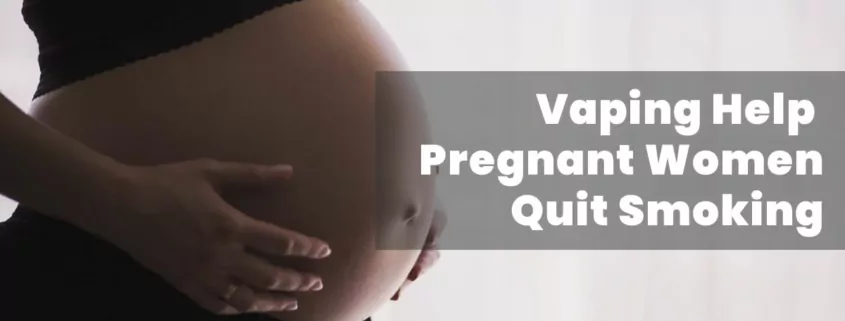Can Vaping Help Pregnant Women Quit Smoking?
Smoking during pregnancy threatens maternal and fetal health, yet quitting unaided hovers around 50%. New observational research suggests vaping could exceed nicotine replacement therapy (NRT) for helping pregnant smokers abstain. However, experts strongly caution definitive conclusions require high-quality randomized controlled trials.
While these preliminary findings offer clues, they cannot prove vaping’s superiority without rigorous placebo-controlled studies. Still, the insights warrant further investigation into vaping’s potential role for expectant mothers unable to quit smoking cold turkey.
Smoking Cessation Imperative During Pregnancy
Smoking while pregnant significantly escalates risks of complications including preterm birth, low birth weight, stillbirth, and long-term impacts on child development, according to the Centers for Disease Control and Prevention [1].
Despite broad understanding of smoking’s harms, unaided quit rates sit around 50% demonstrating addiction’s obstinacy [2]. Nicotine replacement therapy including patches and gum has shown mixed efficacy among pregnant populations [3].
Seeking improved solutions, University at Buffalo researchers analyzed real-world data comparing smoking abstinence rates for pregnant vapers versus nicotine replacement therapy users. Their findings suggest vaping’s promise but require verification through rigorous clinical trials.
Vaping Associated With Twice the Quit Rates of NRT
Analyzing 2016-2020 survey data from over 1,300 pregnant vapers and nicotine replacement therapy users, researchers found:
- 50.8% of pregnant vapers reported abstaining from smoking later in pregnancy
- Just 19.4% of pregnant NRT users successfully remained abstinent
“It’s possible that existing e-cigarette users, meaning those who had started using prior to becoming pregnant, had had positive experiences with these products after an initial adjustment period,” said lead researcher Dr. Xiaozhong Wen, noting vaping’s similarity to smoking motions.
However, pregnant vapers who began vaping after learning of pregnancy saw lower, 19.4% quit rates comparable to NRT. More research must explore whether vaping improves outcomes over NRT.
Interpreting Observational Data WithCaution
Despite vapers’ higher quit rates, the authors strongly discouraged deeming this evidence that pregnant women should vape instead of using NRT.
“The associations we have identified between use of e-cigarettes and abstinence during pregnancy might not be causal, especially given substantial confounding factors, such as smoking intensity,” the researchers noted.
While these real-world observations flag vaping’s potential benefits, only randomized controlled trials can provide reliable evidence of efficacy and fetal safety needed to guide recommendations.
Pinpointing Vaping’s Role Requires Rigorous Clinical Trials
Lead researcher Dr. Wen emphasized the urgent need for robust comparative trials pitting vaping head-to-head against NRT during pregnancy to establish stronger evidence around outcomes.
In the meantime, these preliminary findings suggest for smokers struggling to quit cold turkey, vaping may hold promise as a harm reduction tool over continued cigarette use. But experts agree obstetricians cannot yet advise pregnant patients to switch to vaping absent clinical trial data.
Properly structured studies are essential to reveal whether vaping could boost abstinence rates and improve maternal-fetal outcomes compared to NRT. But those definitive answers require randomized placebo-controlled trials.
Observational Research Warrants Further Investigation
While falling short of conclusive proof, these observational insights indicating vaping’s potential advantages over NRT merit additional scrutiny through rigorous comparative trials.
If verified, vaping could provide an avenue to assist more pregnant smokers in achieving abstinence and avoiding smoking’s threats. But experts concur pregnant women should not assume vaping safety or efficacy before clinical trials establish stronger evidence.
Continued research will illuminate vaping’s appropriate role during pregnancy. These preliminary findings suggest the possibility that for expectant smokers struggling to quit, vaping may offer a less harmful alternative. But controlled trials must now provide clearer guidance.
Resource:
[1] “Tobacco Use and Pregnancy.” Centers for Disease Control and Prevention, 2022, https://www.cdc.gov/reproductivehealth/maternalinfanthealth/tobaccousepregnancy/index.htm.
[2] Colman, Greg, and Doan Q. Dinh. “Changes in Smoking during Pregnancy.” Maternal and Child Health Journal, vol. 22, no. 8, 2018, pp. 1171–1177., https://doi.org/10.1007/s10995-018-2535-2.
[3] Myung, Seung-Kwon, et al. “Pharmacotherapy for Smoking Cessation: A Systematic Review and Meta-Analysis.” JAMA, vol. 325, no. 11, 2021, p. 1059., https://doi.org/10.1001/jama.2021.3055.
- Minneapolis Sets $25 Minimum Price for E-Cigarettes - July 11, 2025
- Alabama Schools to Implement New Anti-Vaping Policies - July 11, 2025
- Is Vaping and Driving Illegal in Rhode Island? (2025 Guide) - July 10, 2025








